Racism in sport: It’s past deadline to fix this
Marwa Hamad, Assistant Editor
Why is it that sports only loves black people for entertainment and trophies, but will so often abandon them in their fight for justice?
Racism is insidious in sports — and has been for far longer than when footballers today started to take a knee in support of the Black Lives Matter moment ahead of matches. From coaches and fans, to referees and even other players, racism offers no long-term reprieve — not on the pitch, not in the locker room, not even in the press rooms afterwards.
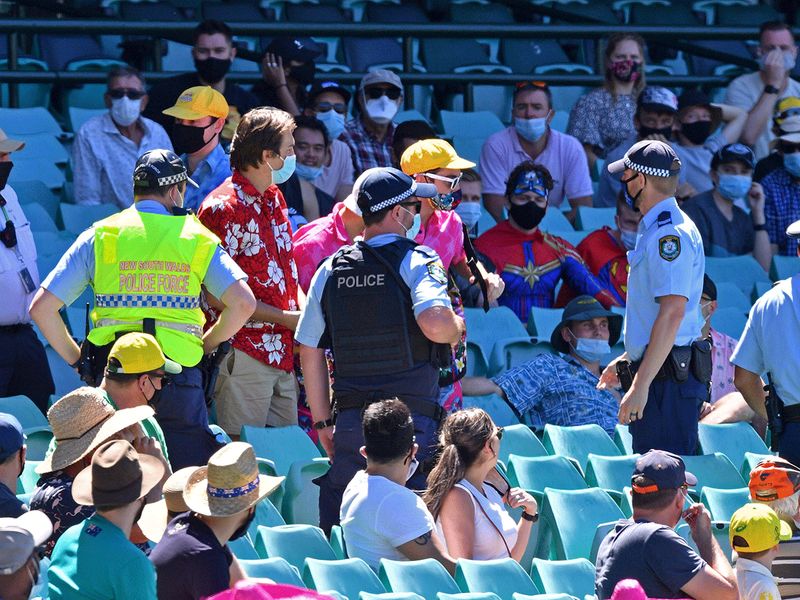
Image Credit: AFP
Players have long reported racist behaviour from their managers, opposition players, and sometimes even verbal abuse from match officials. Sports reporters in 2020 admitted they were expected to keep race — and racism — out of their reporting for most of their careers, even when it was central to the story. The public has seen the side-by-side headline comparisons that showed how some publications frame stories more malignantly depending on the race of the player.
Not only that, but racism is present in the very idea that black players are somehow predisposed to be good athletes, ‘gifted’ in that area and that area alone. They are viewed as highly profitable but dispensable — and they are not afforded the same empathies as non-black players, who are seen as inherently more vulnerable and more deserving of sympathy. This is not a new occurrence by any means. In 2012, a comment piece by Deadspin summed it up right in the headline: “Why We Expect Black Football Players To Return From Injury Faster Than White Players.”
The response? Racism.
The exploitation of black players in sport — and, by extension, sport-based entertainment — is prevalent in every major game, from association football and American football, to the NHL, the NFL and even the youth leagues, where teens report being victims of racist slurs. It’s a microcosm of society at large: The athletes in question are expected to serve the greater good of the game, but are dismissed from good graces as soon as they fall short of the perceived mark. Furthermore, they’re sometimes gaslit about their own experiences of racism as certain people seek to downplay its effects — “Keep politics out of it,” they’ll say.
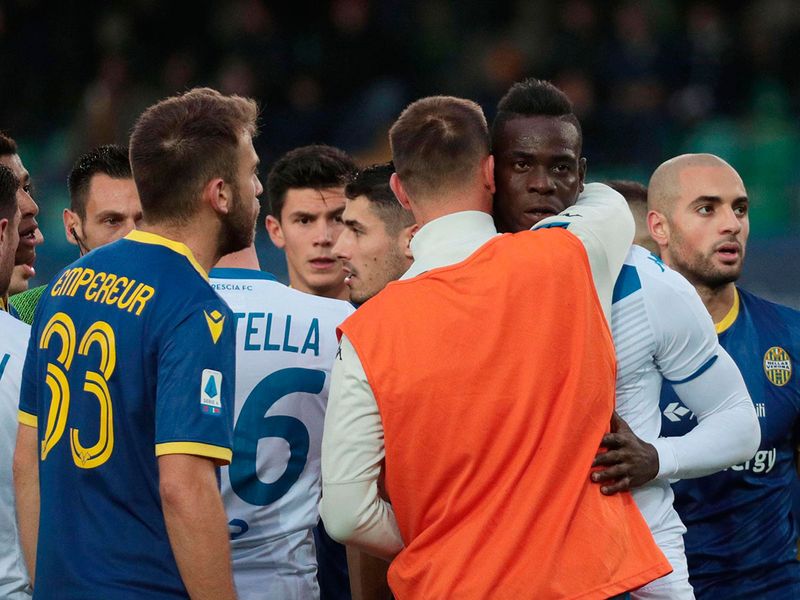
Image Credit: AP
In 2019, when Italian footballer Mario Balotelli was assaulted with a barrage of racist monkey chants in Verona, he kicked the ball into the stands before attempting to leave the pitch (his teammates convinced him to stay). Later, he had this to say: “Thanks to all the colleagues on the field and off for the solidarity I had with me, and all the messages received from you fans … You have proven to be true men not like those who deny the evidence.”
This extends to other minorities, too. In 2019, German-Turkish Muslim player Mesut Ozil slammed the German Football Association and its president, Reinhard Grinde, stating: “People with racially discriminative backgrounds should not be allowed to work in the largest football federation in the world that has players from dual heritage families.”
It would be naive to say the world is more divided than ever. More accurately: it is as divided as ever. White supremacy has reared its ugly head in every arena throughout history, and at best, hid itself in plain sight.
Crystal Palace striker Wilfried Zaha last year shared messages from a 12-year-old boy, who shared images of a Ku Klux Klan rally, telling Zaha: “You better not score tomorrow you black [expletive].” The pre-teen was arrested and questioned — but at what point does responding to racism become a suitable replacement for actively eradicating it?
Fans chanting racist slurs is a problem. Fans hurling racist slurs at other fans is a problem. The public holding different standards for player behaviours on the pitch (and in their personal lives) based on skin colour is a problem. The media portraying players in a different light based on race is a problem. Coaches mouthing off with racist comments, referees making bad calls based on skin colour and people of all ages taking to social media platforms to send targeted abuse … it’s a problem.
It’s not the time for sports to turn a new page. That time has already come and gone, and it’s way past deadline to fix it. But it’s still a problem, and it still needs to be fixed. Not with a few strips of tape to stop the leaks, but with an overhaul of attitude, and to address every facet of racism in sports adequately and for generations to come.
Cricket has taken baby steps, but there’s still a long way to go
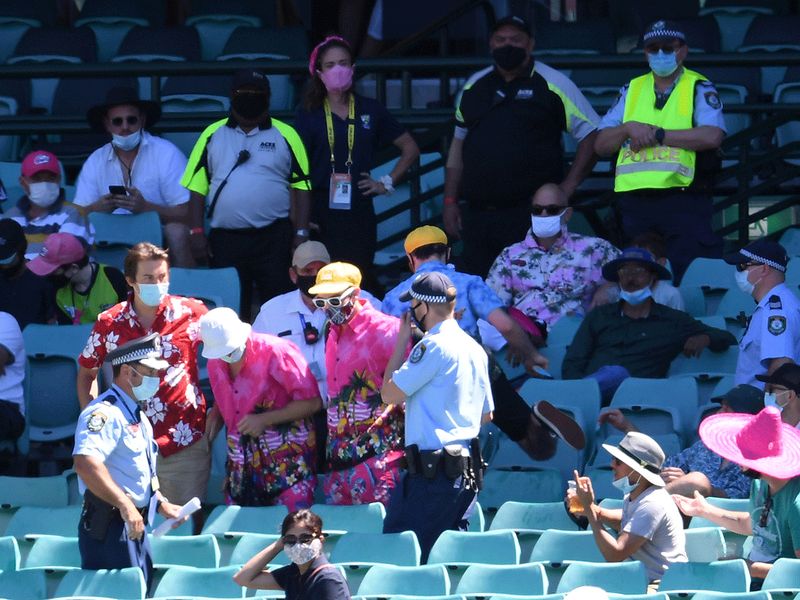
Image Credit: Reuters
Gautam Bhattacharyya, Senior Associate Editor
“In the plays of old times, Judas would always be portrayed as a black man … we all know of Thomas Alva Edison being the discoverer of light, but do we know who discovered the carbon filament which keeps it burning? He was a black scientist called Lewis Howard Latimer, but how many people have heard about it?’’
Those were strong words from Michael Holding, the West Indian fast bowling legend, in an emotional, scathing speech as one of the TV pundits on the eve of the England-West Indies Test match when international cricket resumed last July. It was the peak of the #BlackLivesMatter movement in the wake of George Floyd’s death — the sentiments were still raw — and we thought that a change might be round the corner.
Six months down the line, it was mob mentality at work among a section of cricket fans — whose disgusting behaviour has ripped open the scourge of racism once again. Like every other walk of life, cricket, a colonial sport by birth — is not immune to this.
Has sport done enough to curb this menace? Roland Butcher, the first black cricketer to play for England, said football had been much more proactive in reining in this menace. “I must say football is a lot better now than it used to be. Football has done a lot to clean up its act,” the Barbados-born cricketer, now 66, said in an interview last year with the BLM movement at its peak.
“They (football) have been very proactive. For a number of years, cricket has not been. I think cricket has sat silently back and really said nothing. I think generally, it is less tolerated in football than it is in cricket,” said Butcher, who played three Tests and three ODIs for England.
Apartheid in South Africa
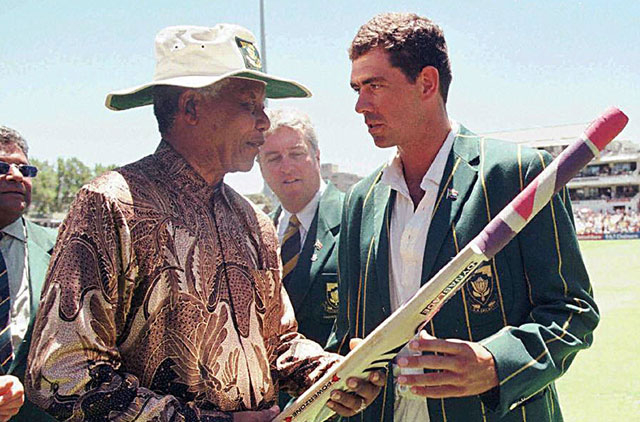
Image Credit: AFP
Cricket had often been at the receiving end of racism as angry players, and irresponsible behaviour from the crowd like in Sydney spewed racial remarks. Many talents were lost to cricket due to the apartheid regime in the rainbow nation of South Africa.
Cricket in South Africa was divided along racial lines during the apartheid years, with two boards: the South African Cricket Union (SACU) and the multiracial South African Cricket Board (SACB). The national team, which comprised some legends like Barry Richards, Graeme Pollock, and Mike Procter, used to play only against England, Australia, and New Zealand.
The Basil D’Oliveira incident on the eve of England’s tour of South Africa (the South Africa-born cricketer was not allowed to travel with the England team because of his ethnic origins) forced a cancellation of the tour. The International Cricket Conference was forced to ban South Africa from the sport in 1970 — a moratorium which lasted for more than two decades.
It was only after the turning point in the South African history, when Nelson Mandela was elected president, that the two factions of the cricket establishment joined hands to form the United Cricket Board of South Africa (UCBSA).
History was made in 1991 when a South African team, led by Clive Rice, stepped on to the Eden Gardens turf to signal the end of a dark chapter in cricket and play a One-day International against an Indian team led by Mohammad Azharuddin. The team included many names familiar to cricket lovers across the world — the seasoned Kepler Wessels who went on to lead the country, Peter Kirsten, Andrew Hudson, Brian McMillan, Dave Richardson (the former ICC CEO) and a young speedster named Alan Donald.
Rumblings of racism
The integration of South Africa into mainstream cricket was only the beginning. In neighbouring Zimbabwe, they started imposing quotas in the selection of national teams. This affected the performance and Zimbabwe degenerated into minnows from a capable opposition in the limited-overs game.
The changing demographics of England, the seat of the game, have seen more cricketers with origins in the subcontinent breaking into the big league. An Indian or Pakistani-sounding name in the England squad like a Moeen Ali, Adil Rasheed or Monty Panesar does not raise eyebrows anymore.
The evolution of franchise cricket (read: Indian Premier League) have also played a part in making the cricketing fraternity one big family. Over the last decade or so, match referees didn’t have to hand out many warnings or penalties for such offences.
However, it’s a scourge whose roots lie in our social history and will never completely go away. The outrage over the Sydney incident may show that the society is possibly thinking in the right direction, but resurrecting the BLM movement and taking the knee alone won’t help. Much more needs to be done.
To get back to Holding’s words, he feels “education and sensitising of both the white and black community is the only way to end this”.
Easier said than done unless we change ourselves!
How black lives matters all began
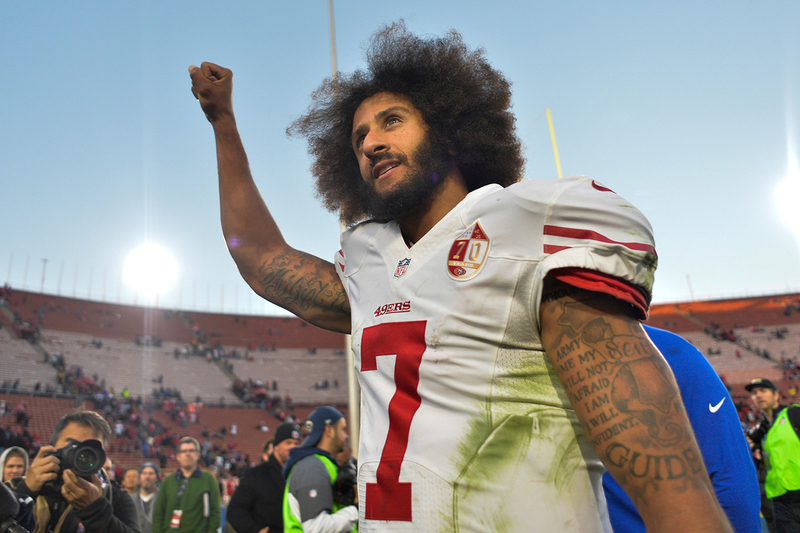
Image Credit: AP
Matthew Smith, Sports Editor
The cloud of racism at the Australia v India third Test in Sydney at the weekend has sadly brought the abuse of athletes back to the top of the agenda. However, in recent times we have seen swelling support in the stance against racism, and the rise of the Black Lives Matter movement.
Let’s take a look back to how we arrived in a much stronger position to combat the abuse in sport.
In June 2020, Black Lives Matter logos began to appear on players shirts in the English Premier League, and players took a knee before every match — a stance that continues to this day as a statement of defiance to the racist bigots that this fight will not go away until the vile abuse is eradicated. We now see players take a knee in sports from NFL to cricket and all stops in between. And it was the popular American sport where it all began.
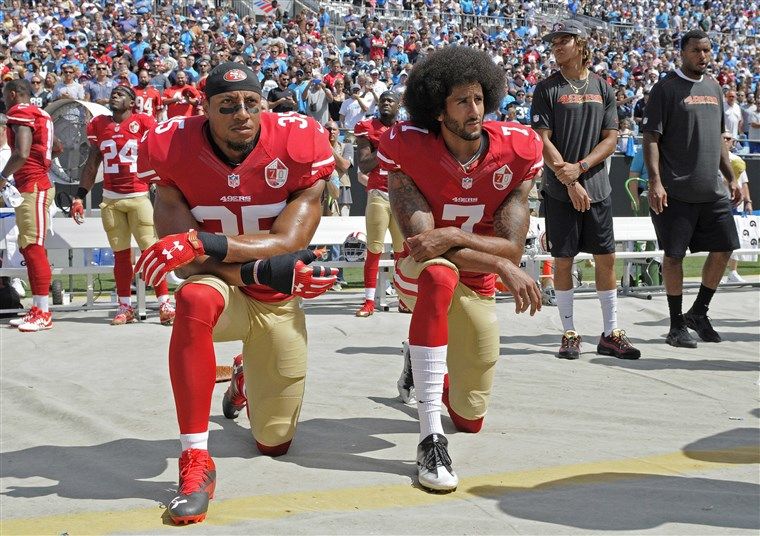
Image Credit: AP
‘Taking a knee’ first hit the headlines in the US back in 2016, when San Francisco 49ers quarterback Colin Kaepernick adopted the stance rather than stand for the American national anthem in protest of the racial abuse — and police brutality — black people across the nation were subjected to in all walks of life. His silent statement created waves he could never have imagined as he was shunned by the NFL decision-makers. Even now, he is still a free agent and without a team.
US President Donald Trump inflamed the situation while speaking at a Republican campaign rally in 2017, stating: “Wouldn’t you love to see one of these NFL owners, when somebody disrespects our flag, to say: ‘Get that son of a [expletive] off the field right now, out. He’s fired. He’s fired!’”
However, thankfully the ball was set in motion. Players in the US Women’s National Basketball Association also began to kneel and, soon, the men’s basketball players in the NBA were following suit, and it was just a matter of time before it went global.
Despite the vitriol on social media from Trump followers and certain right-wing groups, those calling for the need for change proved stronger, and in 2020 the NFL bowed to pressure and removed the threat of fines and suspensions and allowed players to take a knee if they so wish.
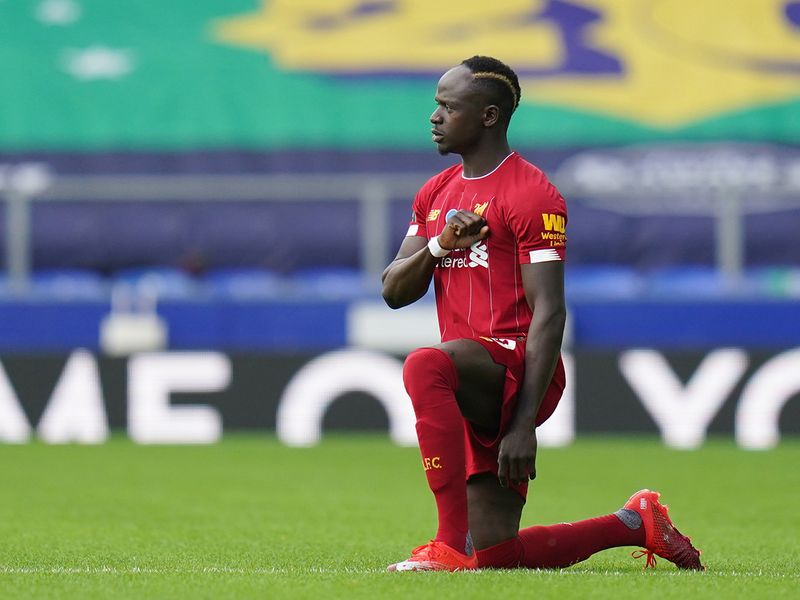
Image Credit: AFP
After the death of George Floyd at the hands of a police officer on May 25, 2020, the peaceful Black Lives Matter demonstrations began to increase. We began to see the waves across the globe, and it was seen no more clearly than in England where players — of all ethnicities — chose to unite and take a knee before each match, following calls from leading players such as Watford’s Troy Deeney and Manchester City’s Raheem Sterling.
Following the death of Jacob Blake, a black man shot seven times in the back by police on August 23 in Wisconsin, the Milwaukee Bucks cancelled their match against the Orlando Magic in protest — exactly four years on from Kaepernick’s symbolic statement. Sports across America — including ice-hockey, soccer and baseball — called off games to show their solidarity and it was becoming clear that this movement was not going away.
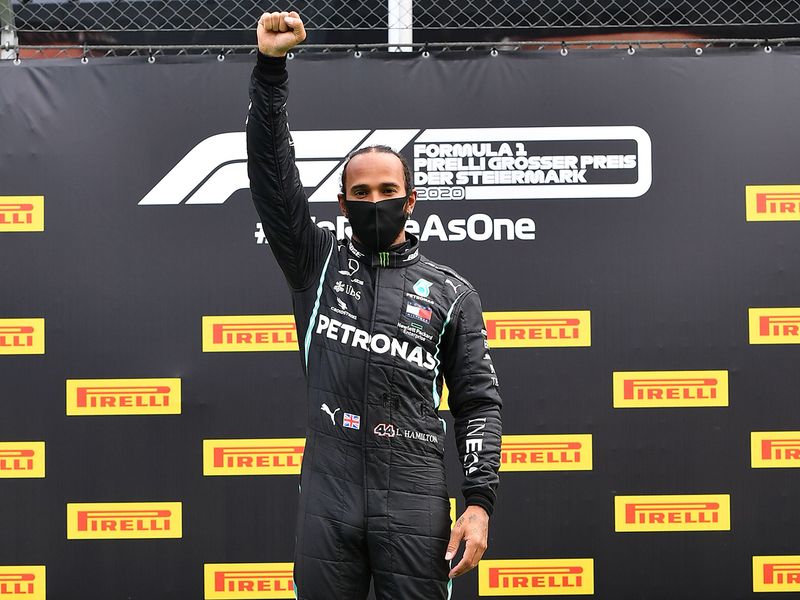
Image Credit: AFP
In motorsport, seven-time Formula One world champion Lewis Hamilton — the only black driver in a massively white-dominated sport — became one of the most vocal supporters for civil rights and Black Lives Matter as he used his victories on the track and time in the spotlight and on the podium to wear T-shirts bearing slogans in support of racial equality. He called out F1 owners to do more, and in a seismic moment, drivers began to take a knee before each race.
In such a short space of time, a belated move towards equality has never seemed stronger. Even so, much still has to be done to end this horrible disorder finally.
Education is key, say EPL legends Barnes and Yorke
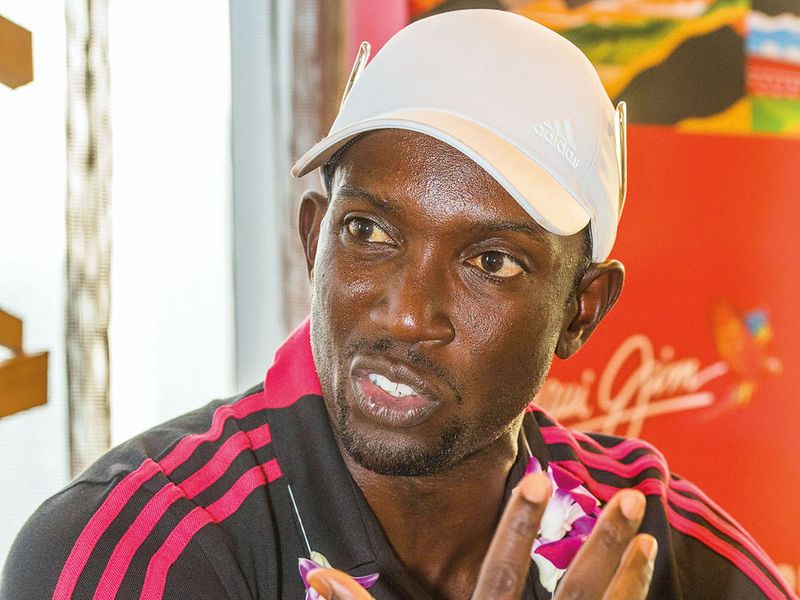
Image Credit: Antonin Kélian Kallouche/Gulf News
Racism in football has hogged headlines across the front and back pages on newspapers in recent times, thanks to players such as Raheem Sterling, Danny Rose and Troy Deeney speaking out against the ugly issue, but Manchester United legend Dwight Yorke insisted it not a resurfacing of the problem, and it has always been there.
Trinidadian Yorke experienced racism first hand while playing for club and country from the late 1980s to 2009 and believes recent events have only highlighted the issue that has always been prevalent in the game.
“It doesn’t matter if you are a player now, or back in my time, it’s always been there,” he said, speaking exclusively to Gulf News. “I played in the 1980s, 90s and in the 21st century and have witnessed banana skins and all sorts of abuse. Football has come a long way in terms of trying to curb this, but in the last couple of years, it seems to have gone right back again. We felt we were making progress — so this is very sad to see. People don’t understand if you are not black, how much the abuse gets under your skin. It’s all very well to say you can’t condone this behaviour but imagine you are black and how you would feel if people were taunting and throwing those remarks at you,” he added. “It’s not nice,” he said after a pause.
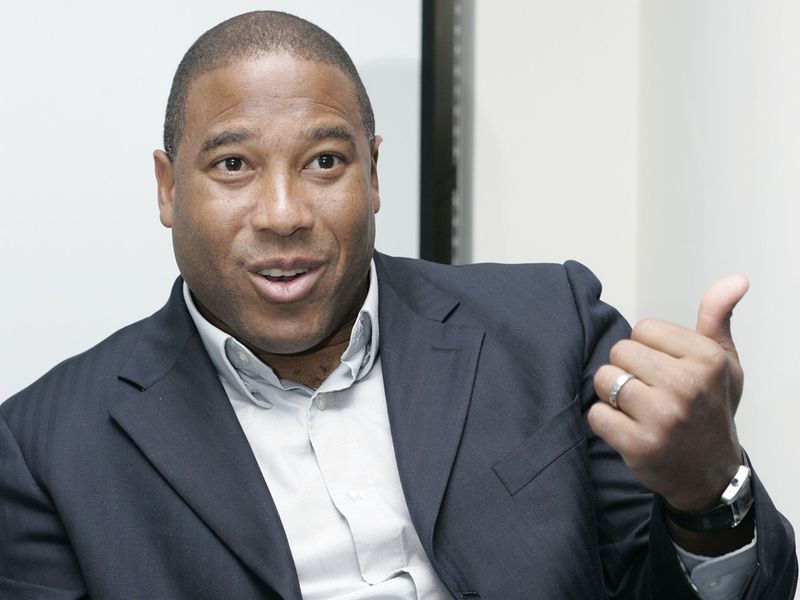
Image Credit: Gulf News Archives
Liverpool legend and active spokesperson against racism John Barnes added that to eradicate racism from the football terraces, society must recognise the problem and where it stems from.
The Jamaican-born Reds, Watford and England hero famously back-heeled a banana skin off the pitch that was hurled at him during a game at Everton back in 1988 in an act of defiance against the bigots.
Thirty-odd years on, another Jamaican-born Englishman — Manchester City’s Sterling — was honoured for his public stance against bigotry and hatred. His admirable defiance of the racists has been in the public eye since he was abused by Chelsea fans during City’s 2-0 defeat at Stamford Bridge in December 2018. Sterling was further abused on England duty against Montenegro in Podgorica on March 25 2019, when he, Callum Hudson-Odoi and Danny Rose called for tough sanctions after they were abused during the match.
Montenegro were ordered to play their next home game behind closed doors due to the incidents, and their football federation was fined $22,000.
While punishing the guilty in such cases is all well and good, Barnes believes it is not enough and the authorities are looking in all the wrong places for both someone to blame and a solution to the problem.
“Surely if Sterling says that the stadium in Montenegro should be shut down for the sake of a few fans, he should be saying the same thing about Chelsea, because he got racially abused there,” Barnes told Gulf News.
“He didn’t say that Chelsea should be closed down and be kicked out of the league. I think we need to be looking closer to home rather than look at what’s going on in another country. We like to talk about the problems in Eastern Europe, but we are having issues here as well.
“The solution is not to walk off the pitch,” Barnes added. “In the past few months, we have seen managers take their team off because of abuse from fans and, in one case, allegedly by a linesman. I do not support that. What happens if your team is losing 3-0? You are going to have a problem. If you are winning fine, but if you are losing, you are giving your fans an incentive to abuse, so the players walk off, and the game is abandoned.
“Not only that, but what if you are losing 3-0 and you walk off the field because you claim you heard abuse and no one else has heard it? It will cause more problems than it will solve.
“I think it’s great that it is being addressed and people are dealing with problems as they arise, but they are coming up with the wrong solutions.
“Only through education and people understanding why people want to be racist and dealing with racism as a wider issue, can you get to the root of this problem. This is not a problem in football, it is a problem in society. It is in all walks of life, not just football, and that is where it needs to be rooted out.”
Racism in football: a timeline
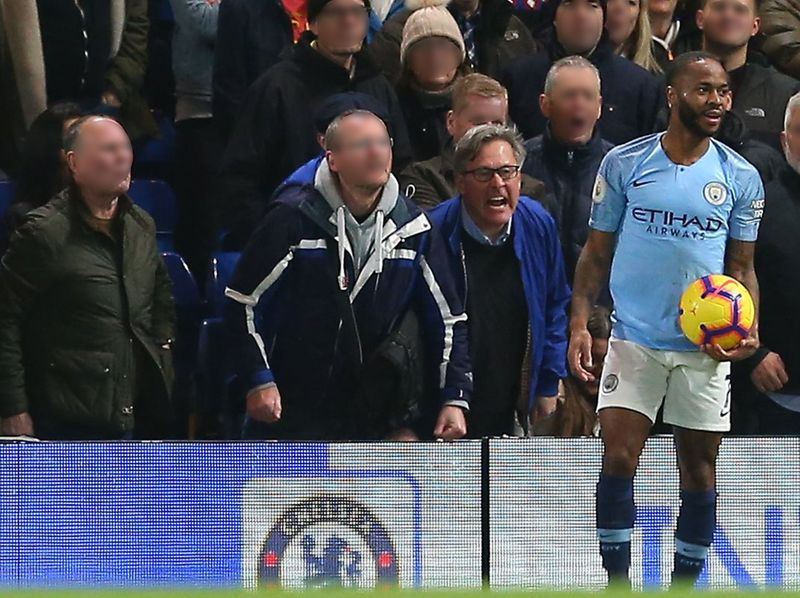
Image Credit: Reuters
Matthew Smith, Sports Editor
DECEMBER 2018
A Tottenham fan hurls a banana skin at Arsenal’s Pierre-Emerick Aubameyang during a derby match in north London.
Manchester City’s Raheem Sterling shows his bravery by laughing at Chelsea fans on the touchline after they threw a torrent of racial abuse at him.
A police investigation in collaboration with Chelsea leading to four Chelsea fans being banned for life.
_resources1_16a30b3f2e9_original-ratio.jpg)
Image Credit: Reuters
MARCH 2019
Sterling scores for England and cups his ears at Montenegro fans who had been racially abusing him and teammate Danny Rose throughout a Euro 2020 qualifier.
Sterling demands a crackdown on racism in the Premier League.
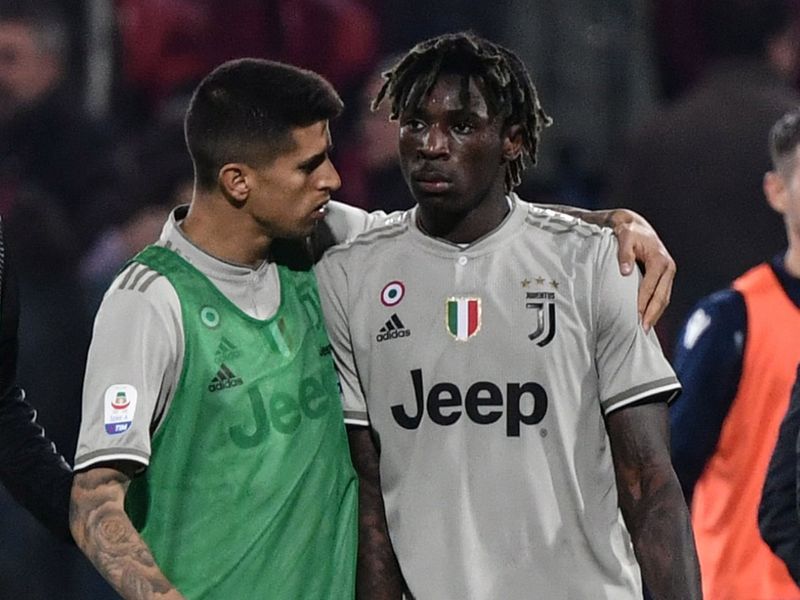
Image Credit: AFP
APRIL
Moise Kean is racially abused while playing for Juventus against Cagliari.
Sterling becomes a spokesperson for the fight against racism as he calls on Fifa to end the abuse and put laws in place to punish those responsible.
Leonardo Bonucci if forced to retract comments in which he claimed Juventus teammate Kean was ‘50-50’ to blame for abuse he received as he celebrated a goal in front of the Cagliari supporters.
Players in the Football League in England launch the ‘Enough’ campaign, and boycott social media for 24 hours.
Lazio supporters hold a banner to praise fascist dictator Benito Mussolini before racially abusing an AC Milan player.
Sterling honoured for his proactive fight against racism at an awards ceremony in London.
Uefa ban Montenegro fans or one match following the abuse at the England match.
Tottenham Hotspur’s England defender Danny Rose says he wants career to end so he can get away from racial abuse.
Watford’s Troy Deeney opens up about the abuse he receives on social media.
Chelsea fans caught on video singing racist song at a Europa League game in Prague. Three players are prevented from entering stadium
Racism spreads to France in April as Ligue 1 game between Amiens and Dijon is suspended for several minutes after abuse is aimed at Prince Gouano.
MK Dons forward Chuks Aneke is abused during match against Tranmere on April 15.
Manchester United’s Ashley Young receives racial abuse on Twitter after Champions League exit to Barcelona.
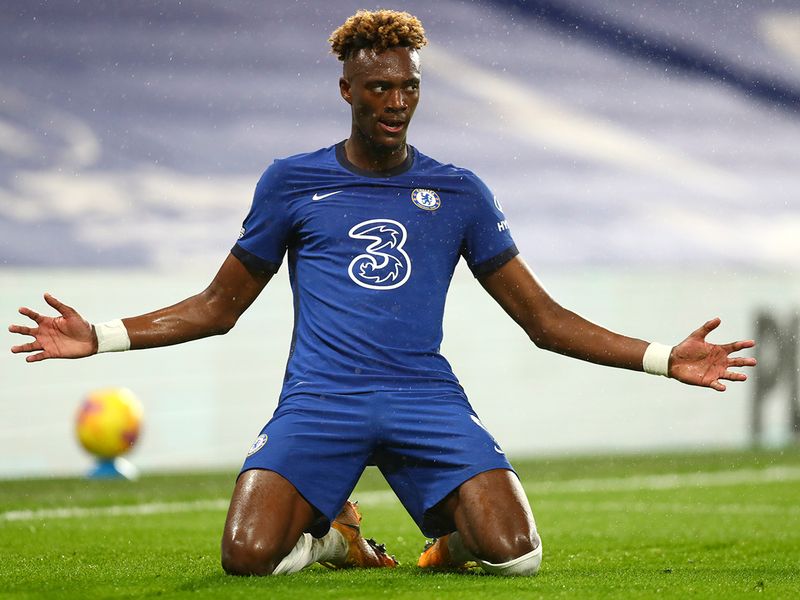
Image Credit: AP
AUGUST
At the start of the new season in August, Chelsea’s Tammy Abraham is targeted online after missing a penalty against Liverpool in the Super Cup final.
Manchester United’s Paul Pogba gets verbal abuse after he misses a penalty.
SEPTEMBER
Inter Milan’s Romelu Lukaku is subjected to racial chants against Cagliari on September 2.
England’s Euro 2020 qualifier against Bulgaria is halted twice due to racist chants from the stands.
NOVEMBER
Sweden striker Alexander Isak is subjected to racist abuse by Romania fans in November.
Italian daily newspaper Corriere Dello Sport comes in for criticism for its ‘Black Friday’ headline alongside images of Inter Milan’s Lukaku and Roma’s Chris Smalling.
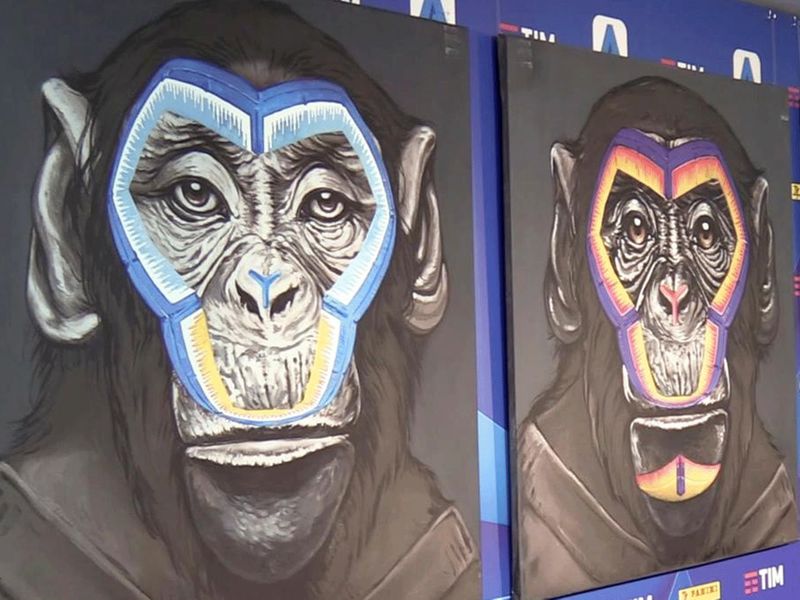
Image Credit: AP
DECEMBER
Serie A’s No To Racism campaign backfires in a major way as it uses pictures of monkeys in its material in December.
JANUARY 2020
Porto’s Moussa Marega gives fans the thumbs down as he walks off during a match, refusing to play on after receiving abuse.
MARCH
The coronavirus clampdown means fans are locked out of stadiums until now.


